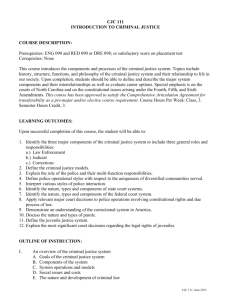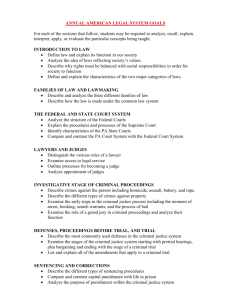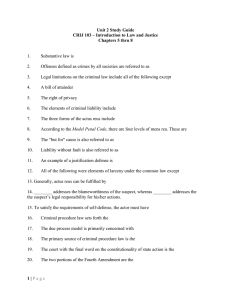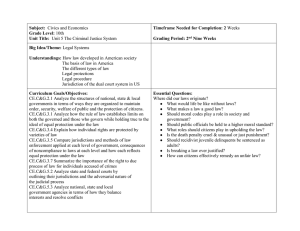introduction - Office of the High Commissioner on Human Rights
advertisement
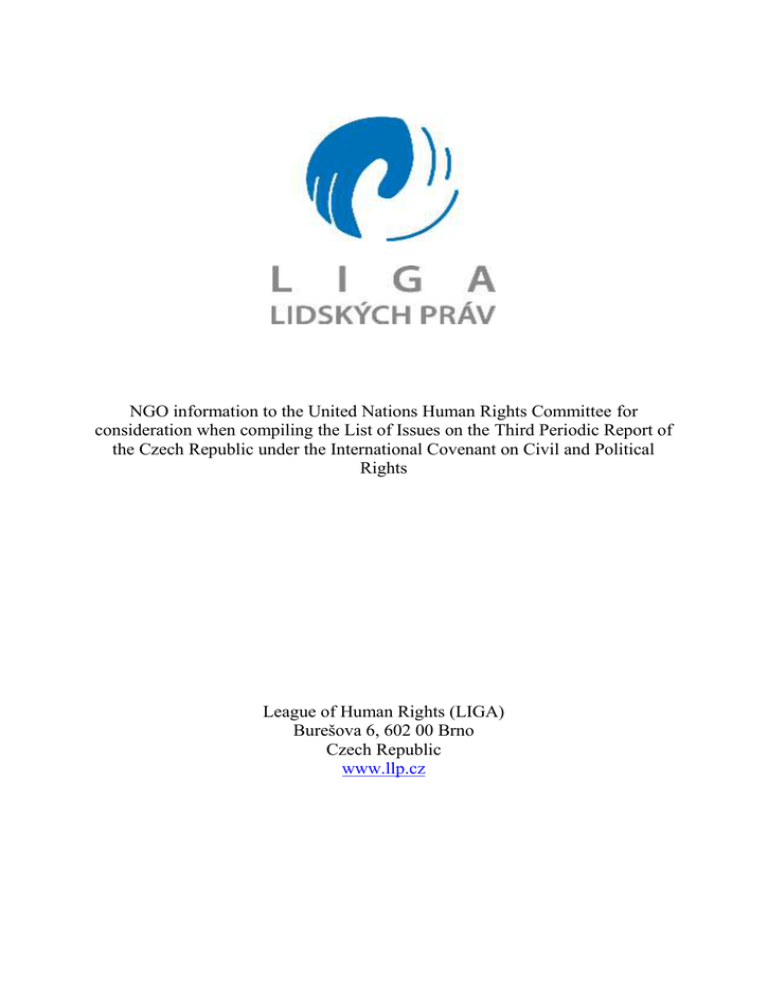
NGO information to the United Nations Human Rights Committee for consideration when compiling the List of Issues on the Third Periodic Report of the Czech Republic under the International Covenant on Civil and Political Rights League of Human Rights (LIGA) Burešova 6, 602 00 Brno Czech Republic www.llp.cz INTRODUCTION 1. This written submission provides information to the United Nations Human Rights Committee (hereinafter “the Committee”) for consideration when compiling the List of Issues on the Third Periodic Report of the Czech Republic under the International Covenant on Civil and Political Rights (hereinafter “the Government’s Report”). This submission concerns relevant issues under the ICCPR with regard to the Czech system of juvenile justice. 2. In the Czech Republic, young children who come into contact with the criminal justice are usually in a vulnerable situation. Most countries acknowledge this vulnerability and require greater protection and support when criminal charges are brought against children, taking into account their age, level of maturity, and intellectual and emotional capacities. The Czech juvenile justice system differentiates between children below the age of criminal responsibility who are aged 0-15, and juveniles who are aged 15-18. The main problem is that children below the age of criminal responsibility are automatically denied access to various basic safeguards under the ICCPR. 3. This submission has been written by the League of Human Rights (hereinafter “LIGA”). LIGA is a non-governmental human rights organization established in 2002 and headquartered in Brno, Czech Republic. Our vision is fair, free and engaged society for all. Since 2002, LIGA has been systematically promoting human rights in criminal justice, including children rights. LIGA is a member organization of Mouvement mondial des droits de l’Homme (FIDH). COMMENTS UNDER THE ICCPR 2. Procedural fairness – articles 14 and 24 ICCPR 2.1. Failure to promote rehabilitation and restorative justice objectives 4. The Czech juvenile justice system does not ensure that the procedure against children below the age of criminal responsibility promotes rehabilitation as is required under Article 14 (4) ICCPR. Rehabilitation relates to the “best interest principle” as recognised under Article 3 Convention on the Rights of the Child (hereinafter “the CRC”) and should be understood together with restorative justice principles. According to the CRC Committee’s General Comment no. 10, “the protection of the best interests of the child means, for instance, that the traditional objectives of criminal justice, such as repression/retribution, must give way to rehabilitation and restorative justice objectives in dealing with child offenders.”1 1 CRC/C/GC/10, 25 April 2007, para. 10. 5. According to the Committee’s General Comment no. 32, “states should take measures to establish an appropriate juvenile criminal justice system, in order to ensure that juveniles are treated in a manner commensurate with their age.”2 In the Czech Republic, even though the Juvenile Justice Act formally recognises restorative justice principles, these do not apply to children below the age of criminal responsibility. Unlike juveniles (aged 15-18), children under 15 years are subject to very paternalistic proceedings under the Criminal Procedure Code, Juvenile Justice Act and Civil Procedure Code. Children below the age of criminal responsibility are perceived as objects of care, rather than subjects with equal procedural rights. In particular, they do not have access to basic procedural safeguards, including the right of access to legal representation (see below paras. 6-9); victims are not involved the proceedings (see below paras. 20-21); and none of the sanctions seek to restore disturbed relationships (see below paras. 13-16). Suggested question to the Government: Please indicate how the state party guaranteed that children below the age of criminal responsibility are treated in a manner commensurate with their age and how does the procedure promotes rehabilitation and restorative justice objectives? 2.2. Failure to provide the child with appropriate assistance in the preparation and presentation of his/her defence 6. The Czech juvenile justice system deprives children below the age of criminal responsibility of their right to appropriate assistance in the pre-trial stage of criminal proceedings as required under Article 14(4) and Article 14 (3)(d) ICCPR. According to the Committee’s General Comment no. 32 “juveniles are to enjoy at least the same guarantees and protection as are accorded to adults under Article 14[…]”3 while “Article 14, paragraph 3(d) guarantees the right to have legal assistance assigned to accused persons whenever the interests of justice so require, and without payment by them in any such case if they do not have sufficient means to pay for it.”4 Also the CRC Committee in its General Comment no. 10 recommends the state parties to “[…] provide as much as possible for adequate trained legal assistance, such as expert lawyers or paralegal professionals.”5 7. Under the Juvenile Justice Act, juveniles (age 15-18) receive obligatory legal assistance from the very first contact of the suspected juvenile with the prosecuting authorities. The reason behind obligatory legal assistance is the lack of maturity to 2 CCPR/C/GC/32, 23 August 2007, para. 42. CCPR/C/GC/32, 23 August 2007, para. 42. 4 CCPR/C/GC/32, 23 August 2007, para. 38. 5 CRC/C/GC/10, 25 April 2007, para. 49. 3 effectively defend themselves in person. This legislation, when comes to juveniles, is in compliance with the Committee’s General Comment no. 32, according to which “the availability or absence of legal assistance often determines whether or not a person can access the relevant proceedings or participate in them in a meaningful way.”6 8. Unlike juveniles, the law does not require obligatory legal assistance by a defence counsel at pre-trial stage to children below the age of criminal responsibility. Even though these children are not criminally responsible, they may still be held liable for unlawful acts and subjected to serious sanctions which are accompanied by deprivation of liberty (see below paras. 17-19). During the pre-trial stage, which in practice takes months, they are routinely subjected to repeat interrogations at police station, and can be subjected to blood sampling, fingerprinting and extracting DNA. It means that vulnerable group of very young children (age 0-15) is provided for much lower legal protection of their procedural rights than more mature children (age 1518). 9. In addition, the domestic legal order does not set forth any specific rules regulating significant investigatory acts, such as reconstruction or recognition, when they concern children below the age of criminal responsibility as suspects. The reason is that these acts should take place normally after the charges are pressed. However, in case of children below the age of criminal responsibility, the police carry out these investigatory acts before the charges are pressed and without complying with adequate procedural safeguards such as legal respresentation. Suggested question to the Government: Please inform the Committee how has the state party guaranteed that children below the age of criminal responsibility are provided with appropriate assistance in the presentation and preparation of their defence during the pre-trial stage of criminal proceedings? 2.3. Failure to provide the child with the right to presumption of innocence 10. As far as children below the age of criminal responsibility are concerned, the Czech juvenile justice system does not respect the presumption of innocence guaranteed under Article 14(2) ICCPR. According to the Committee’s General Comment no. 32 “the presumption of innocence, which is fundamental to the protection of human rights, imposes on the prosecution the burden of proving the charge, guarantees that no guilt can be presumed until the charges has been proved beyond reasonable doubt, 6 CCPR/C/GC/32, 23 August 2007, para. 10. ensures that the accused has the benefit of doubt, and requires that persons accused of a criminal act must be treated in accordance with this principle.”7 11. In the Czech juvenile justice system, it is not necessary to prove that the child below the age of criminal responsibility committed unlawful act beyond reasonable doubt. The trial stage is governed by the Civil Procedure Code and therefore the civil burden of proof applies. Contrary to the criminal court, the juvenile court is not required to interview witnesses and examine and collect other evidence necessary to prove the child’s guilt beyond reasonable doubt. The juvenile court usually relies solely on the police file, often including child’s self-incriminating statements obtained during the interrogations. Suggested question to the Government: Please provide information how exactly children below the age of criminal responsibility benefit from the presumption of innocence if suspected of committing an unlawful act and that their responsibility for unlawful act is proved beyond reasonable doubt? 2.4. Lack of pre-trial alternatives 13. According to the Committee’s General Comment no. 17, Article 24 ICCPR provides all children with the right to special measures of protection because of their status as minors.8 In the General Comment no. 10, the CRC Committee recommends the state parties to “[…] take measures for dealing with children in conflict with the law without resorting to judicial proceedings as an integral part of their juvenile justice system […].”9 14. In cases of children below the age of criminal responsibility, the Czech juvenile justice system does not provide for any diversions from judicial proceedings (alternatives to proceedings). Indeed, under the Juvenile Justice Act the prosecutor is obliged to refer the child to the juvenile court. This is also the case when findings suggest that judicial proceedings and further stigmatization is not necessary. Furthermore, according to domestic case-law, the juvenile court should not refrain from imposing measures if the child does not attend the court hearing.10 Children below the age of criminal responsibility are always subjected to judicial proceedings, including when committing petty offences. The law does not enable the prosecuting authorities to 7 CCPR/C/GC/32, 23 August 2007, para. 30. CCPR General Comment no. 17, 7 April 1989, para. 4. 9 CRC/C/GC/10, 25 April 2007, para. 26. 10 Regional Court of Hradec Králové, decision of 18 May 2005, no. 12 Rodo 7/2005. 8 protect the child from potential harm caused by stigmatization before the juvenile court.11 Suggested question to the Government: Please indicate the measures that the state party has taken in order to ensure that children below the age of criminal responsibility are dealt with without resorting to judicial proceedings whenever appropriate and desirable? 3. Sanctioning of children below the age of criminal responsibility – Articles 14 and 24 ICCPR 3.1. Failure to recognize restorative justice measures 15. The Government mentioned sanctioning of children below the age of criminal responsibility under para. 151 of their Report. This information is very limited. The Government just noted the extension of the range of possible sanctions. Under Article 93(1)-(9) of the Juvenile Justice Act, if found guilty, the court can impose one or a combination of following sanctions: a) educational duties, b) educational restrictions, c) warning from competent authorities, legal representatives, school or educational facility, d) supervision of a probation officer, e) assignment to the therapeutic, psychological or other appropriate upbringing programme in the upbringing care facility, f) protective custody, g) protective medical treatment (ambulatory or institutional). 16. Even though there is a range of sanctions available, none of them is based on restorative justice principles. According to the Committee’s General Comments no. 32, “whenever appropriate, in particular where the rehabilitation of juveniles alleged to have committed acts prohibited under penal law would be fostered, measures other than criminal proceedings, such as mediation between the perpetrator and the victim, conferences with the family of the perpetrator, counselling or community service or educational programmes, should be considered, provided they are compatible with the requirements of this Covenant and other relevant human rights standards”.12 The law The CRC Committee in its General Comment no. 10 specifically noted obligation of the state parties “[…] to promote measures for dealing with children in conflict with the law without resorting to judicial proceedings”, and emphasized particularly that these are not certainly “[…] limited to children who committed minor offences, such as shoplifting or other property offences with limited damage, and first-time child offenders.”. See, CRC/C/GC/10, 25 April 2007, para. 25. 12 CCPR/C/GC/32, 23 August 2007, para. 44. 11 does not explicitly provide for any form of mediation between the child under the age of criminal responsibility and the victim, or any form of conferences with the family of the perpetrator, either during the proceedings before the juvenile court, or as a result of the proceedings. Suggested question to the Government: Please provide information whether the state party has ensured that measures such as mediation between the perpetrator and the victim, conferences with the family of the perpetrator are provided in cases when the child below the age of criminal responsibility is the perpetrator? 3.2. Lack of proportionality when imposing protective custody 17. The child’s right to special measures of protection guaranteed under Article 24 ICCPR requires respecting principle of proportionality. According to the CRC Committee’s General Comment no. 10, every measure imposed on a child in conflict with the law should “always be in proportion not only to the circumstances and gravity of the offence, but also the age, lesser culpability, circumstances and needs of the child, as well as to the various and particularly long-term needs of the society.”13 18. In the Czech Republic, the juvenile court can impose very serious measure of protective custody on the basis of “disruption of child’s personality”; the gravity of committed offence is not a necessary criterion.14 This very paternalistic approach results in deprivation of liberty of a child and forced placement in the detention centre. The centres are sometimes equipped with bars on the windows and camera monitoring and there are special constructions and technical means to prevent the escape of a child. Children under the protective custody are usually not entitled to receive visits from persons other than relatives and to go for a walk outside the facility without supervision. Suggested question to the Government: Please indicate how has the state party guaranteed that measures imposed on children below the age of criminal responsibility are proportional and that deprivation of liberty is used with respect to those children as a measure of last resort? 13 14 CRC/C/GC/10, 25 April 2007, para. 71. The Supreme Court of the Czech Republic, decision of 30 April 2008, no. 8 Tdo 514/2008. 3.3. Failure to impose protective treatment for definite period 19. In 2011, the Government expanded the list of available measures and introduced the measure of protective medical treatment. The protective medical treatment is a standard criminal sanction which can be imposed on adults and juveniles and has either ambulatory or institutional form. The institutional form is accompanied with forced hospitalisation in a psychiatric facility and forced medical treatment. Despite its extreme seriousness, the law does not provide for maximum duration; it only provides for periodic review (every 12 months). However, contrary to juveniles and adults, a child below the age of criminal responsibility is not automatically released if the juvenile court fails to carry out this obligation. The child below the age of criminal responsibility can be deprived of liberty in a psychiatric facility for indefinite period. Suggested question to the Government: Please provide information on the steps taken in order to ensure that sanctions of indefinite duration are not imposed on children below the age of criminal responsibility? 4. Failure to ensure victims’ participation – Articles 2, 14 and 26 ICCPR 20. The Czech system of juvenile justice does not ensure the healing power accompanying full victim participation throughout proceedings against children below the age of criminal responsibility. Unlike proceeding against juveniles, the proceedings against younger children do not require active victim participation and also do not offer any real procedural possibility for the victim to take active part at any stage of the proceedings. The 1985 UN Declaration of Basic Principles of Justice for Victims of Crime and Abuse of Power recognised victims’ rights of access to justice and fair treatment. The UN General Assembly moreover emphasised that where appropriate, like in a juvenile justice system, the “informal mechanisms for the resolution of disputes, including mediation, arbitration and customary justice or indigenous practices, should be utilized […] to facilitate conciliation and redress for victims.“15 Also the CRC Committee in its General Comment no. 10 on juvenile justice recommended the state parties to acknowledge different forms of victims’ participation based on restorative justice principles, including mediation and conferences.16 21. In the pre-trial phase, the victim is not officially involved in the proceedings and there is no legal possibility for the police or probation service to put together the perpetrator and the victim, e.g. in a form of mediation of conference. The child and the victim 15 16 A/RES/40/34, 29 November 1995 CRC/C/GC/10, 25 April 2007, para. 27. cannot benefit from any form of reparatory mediation. During the trial stage, the victim is not recognised under the Czech law as a concerned party, has no official standing and cannot take an active part. Thus, the victim is fully excluded from the proceedings before the juvenile court. Finally, there is no measure available under the Czech law which would facilitate reparation of damaged relationships between the perpetrator and the victim and their communities. Suggested question to the Government: Please indicate how the state party plans to ensure victims’ rights in proceedings against children below the age of criminal responsibility under the Juvenile Justice Act and the Civil Procedure Code? Brno, 28 December 2012 David Zahumenský Chairman Liga lidských práv (LIGA) Burešova 6 602 00 Brno, Czech Republic tel.: +420 545 210 446 fax: +420 545 240 012 e-mail: brno@llp.cz

